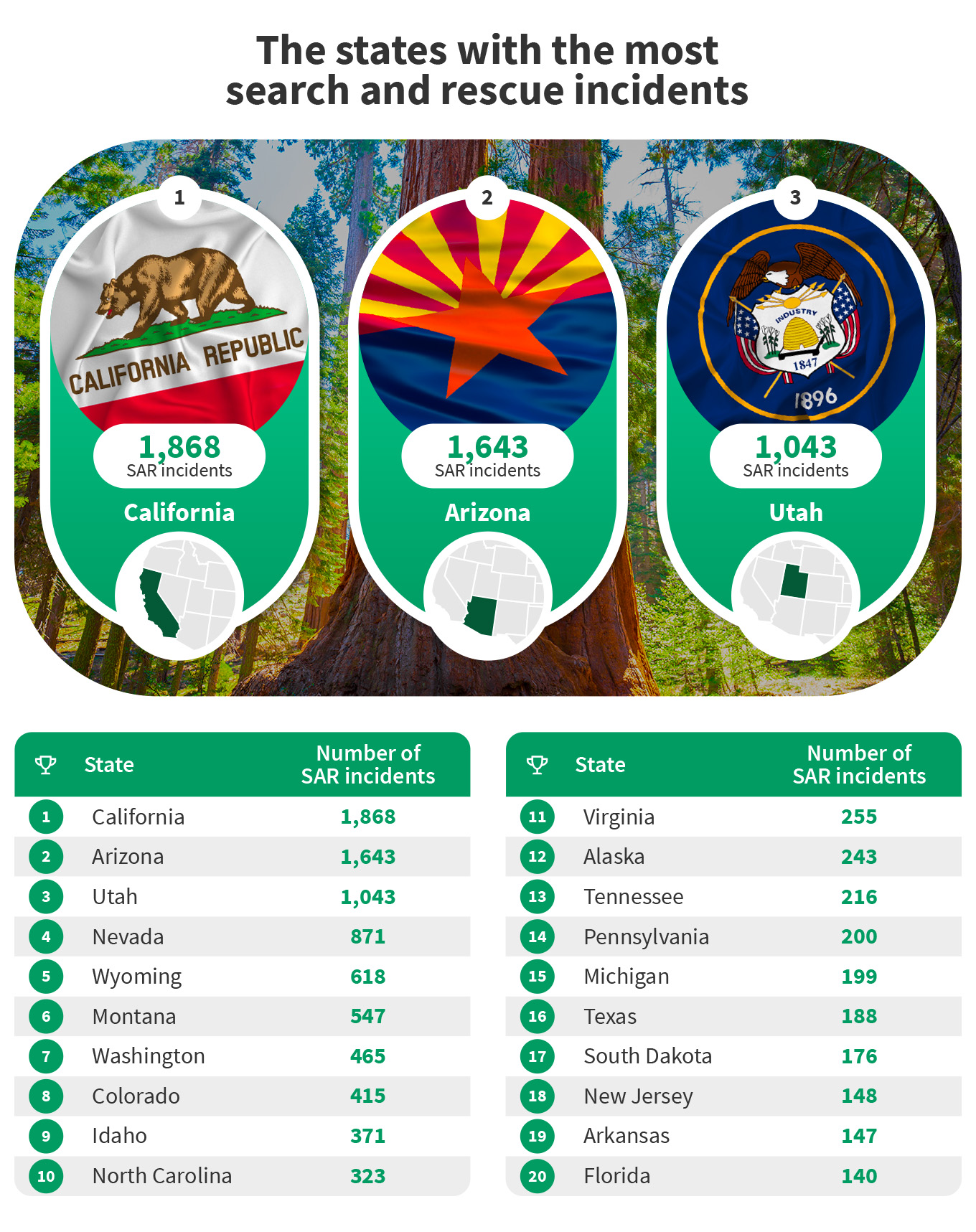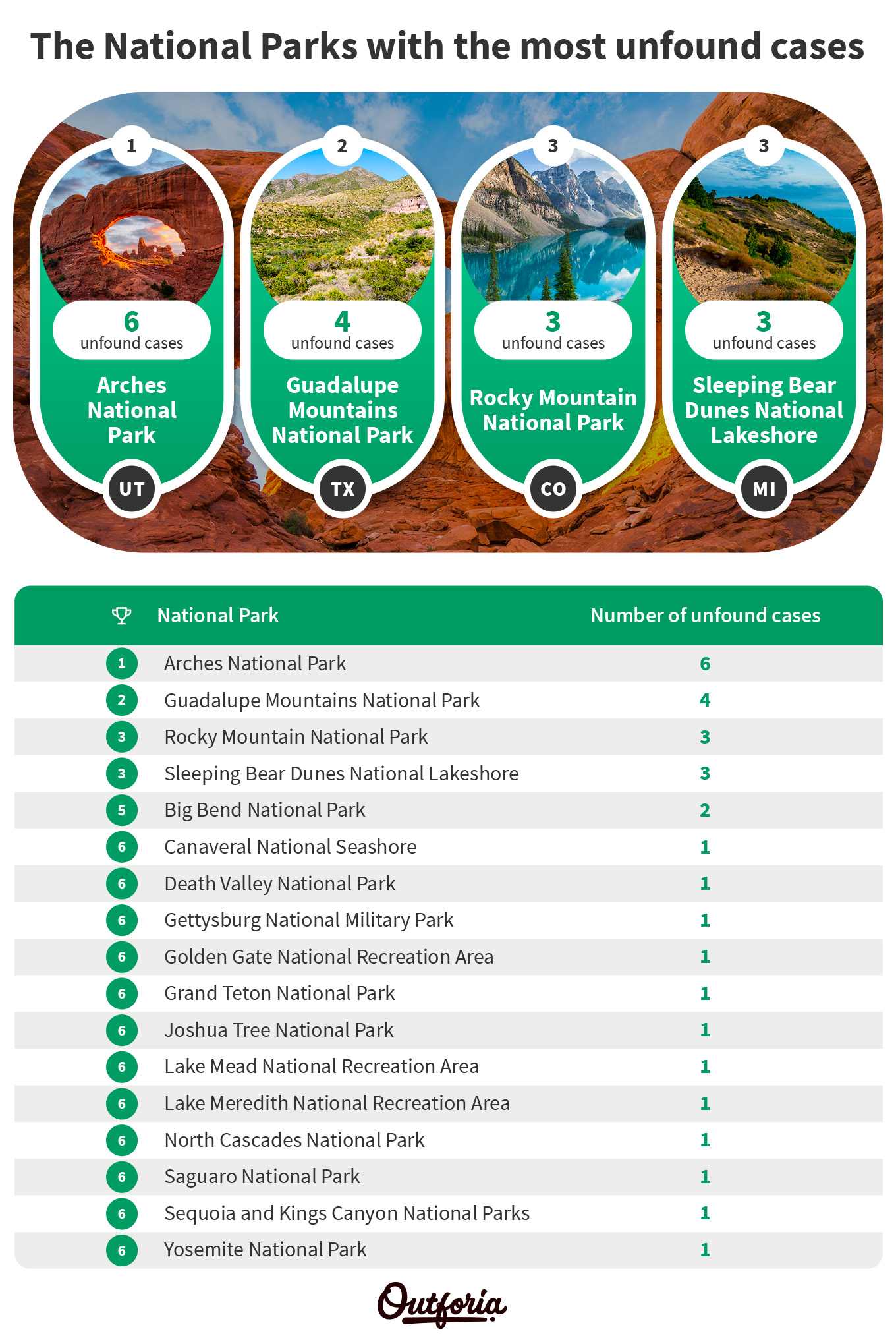How Many People Have Gone Missing In National Parks - A Look At "Many"
The vast, open stretches of our grand natural areas, those places we call national parks, hold an undeniable allure for countless individuals seeking peace, adventure, or simply a moment away from busy lives. Yet, with all that beauty comes a certain quiet mystery, a hushed question that sometimes surfaces: just how many people, you know, have gone missing in these immense, wild spaces? It's a thought that can make anyone pause, a consideration that feels heavy in the air.
When we think about folks who might get lost or simply disappear in such sprawling, untamed environments, the word that often comes to mind is "many." It's a word we use quite a lot, isn't it? "Many" suggests a good number, a collection of individuals that isn't small, but it also doesn't give us a precise figure. It points to a sizable quantity, a group that is more than just a couple, yet it keeps the actual total somewhat hidden, a bit out of reach, so to speak.
This idea of "many" is really interesting when we think about people who vanish from these beautiful, but sometimes challenging, park settings. It’s a word that helps us talk about a large, but often vague, group of individuals. This discussion isn't about giving you exact figures, because, as a matter of fact, the very definition of "many" points to a number that's not quite definite. Instead, we'll explore what "many" truly means in this context and how we perceive such an indefinite quantity of people gone missing in national parks.
Table of Contents
- The Idea of "Many" in Vast Spaces
- What Does "Many" Really Mean When Someone Goes Missing?
- Why Is "Many" Such an Indefinite Number?
- How Can We Think About "Many" People Gone Missing?
- "Many" Versus "Few" - The Perception of Numbers
- Is That a Large Number of People Gone Missing?
- The Language We Use - Counting the Uncountable
- What Does "Many" Imply for Those Who Care?
The Idea of "Many" in Vast Spaces
When we consider the vastness of national parks, it's easy to picture a good number of folks exploring trails, camping under the stars, or simply taking in the grand views. It's a common thought that a large, indefinite number of people visit these spots each year. So, when the discussion turns to people who, for whatever reason, don't return from their outings, the word "many" often crops up. It's almost as if the sheer scale of these natural wonders lends itself to the idea of a sizable, but not easily counted, group of individuals experiencing something unexpected. This word, "many," really just means a large but indefinite number, and that fits quite well with the sprawling nature of these parks, doesn't it?
The concept of "many" here isn't about precise figures, but rather about a general sense of a considerable quantity. We use "many" to indicate that we are talking about a large number of people or things, as the dictionary might tell us. In this context, it speaks to a feeling, a perception, that there are more than just a handful of situations where someone might become lost or disappear. It suggests a recurring pattern, perhaps, or at least a situation that isn't entirely rare. The word itself carries a certain weight, implying that this isn't an isolated incident, but something that happens with some frequency, or involves a good number of folks, you know?
It's interesting how our minds process "many." It's not a single person, nor is it a small group like a couple of individuals. Instead, it’s a quantity that feels significant, a collection that demands our attention, even if we can't put a firm number on it. This is why "many" is such a popular and common word for this idea of a large, but undefined, count. It allows us to talk about a substantial group without getting bogged down in exact statistics, which might be hard to come by anyway when it comes to people gone missing in such expansive areas.
What Does "Many" Really Mean When Someone Goes Missing?
So, when we ask, "how many people have gone missing in national parks?" and the answer involves the word "many," what are we truly saying? "Many" refers to a large number of items that one can count. People are certainly items one can count, but when they are gone, that count becomes, well, complicated. The meaning of "many" is "consisting of or amounting to a large but indefinite number." This means that when we say "many people have gone missing," we are acknowledging a significant quantity, but we are also admitting that the exact count is not known or perhaps not easily determined. It’s a way of speaking about a serious issue without being able to offer a precise tally.
Think about how we typically use "many" in sentences. It's often found in questions, like "Do you have many things to do today?" or in statements that express a lack of something, such as "Not many films are made in Finland." In the context of people disappearing in parks, the question "How many people will be at the party?" is a bit like asking about those who haven't returned. It implies a desire for a number, but the word "many" itself signals that the number is likely substantial, yet still a bit of a mystery. This usage highlights the uncertainty that often surrounds these situations, really.
The word "many" itself suggests a collective experience, a number of units. It implies the presence or succession of a large number of units, whether those units are people, days, or students. In this case, the units are individuals who have vanished. It's a way of saying that this isn't a one-off event, but something that has happened more than just a few times. It’s about a pattern, or a general trend, that involves a good many individuals, which is why it feels like a topic worth discussing.
Why Is "Many" Such an Indefinite Number?
The very nature of "many" is that it's a large, indefinite number. It doesn't give us a hard figure. When we talk about people who have gone missing in national parks, this indefiniteness becomes even more pronounced. How do you get "many" of something? You do something frequently, or often. For example, having many miles on a car happens because you often drive it long distances. In the case of people going missing, it suggests that such occurrences are not rare, but happen with a certain frequency, leading to a collection of situations that amount to a large, but uncounted, group. This makes it hard to pin down, so it's almost a feeling more than a number.
The phrase "a large, indefinite number of" is a core part of what "many" means. It's not like saying "a couple of," "a few," "a handful of," or "several," which suggest smaller, more manageable quantities. "Many" takes us beyond that. It pushes us into the territory where the sheer volume makes precise counting difficult, or perhaps even impossible, given the circumstances of a disappearance in a vast wilderness. It's the difference between knowing exactly how many apples are in a basket and just knowing there are "many" leaves on a tree. One is countable with ease, the other, not so much.
When we consider the phrase "the majority of the people," it suggests a large portion, perhaps even more than half. "Many" often leans in this direction, implying a significant portion of a larger group, even if that larger group is all the people who visit national parks. The idea that "the many fail, the one succeeds," as Tennyson put it, also speaks to this concept of a large, unspecific group facing a particular outcome. In this context, it highlights the general sense of a considerable number of individuals who have, unfortunately, not been accounted for after their visits. It's a thought that, you know, tends to stick with you.
How Can We Think About "Many" People Gone Missing?
Thinking about "many" people who have gone missing requires us to accept a certain level of imprecision. We are dealing with a large but indefinite number. It's not about a specific tally, but about the idea that this is a recurring concern, affecting a good number of individuals. It's like saying "a good many of the workers had the flu." It tells you it wasn't just one or two, but a noticeable portion, enough to cause concern. In the parks, it suggests a number of cases that feels substantial, even if we don't have a spreadsheet with names and dates.
The word "many" can be used with words for things that we can count, which people certainly are. Yet, when someone is missing, the act of counting them becomes a challenge. We know there are individuals, but the collective total remains elusive. This is different from "much," which is used with words for things we cannot count, like "much water" or "much time." With "many people," we are talking about distinct human beings, each with their own story, but whose collective number in this context remains, well, a bit of an open question. It's a peculiar situation, really.
So, how do we approach this idea of "many" people gone missing? We can think of it as "numerous," "multiple," or "several," as these words also point to a quantity greater than just a few. Sometimes, it might even feel like "countless" or "multitudinous," especially when the sheer scale of the parks is considered. It’s about acknowledging that this is a phenomenon that touches a good number of lives, even if we don't have a precise figure to attach to it. It’s about the presence of a succession of units, as the definition of "many" implies.
"Many" Versus "Few" - The Perception of Numbers
The contrast between "many" and "few" really shapes our perception. If we were to say "few people have gone missing in national parks," it would suggest a rare occurrence, something that happens so seldom that it barely registers. But when the word "many" is used, it instantly conjures up a different picture. It implies a frequency, a scale, that makes us pay attention. "Many" implies the presence or succession of a large number of units, unlike "few," which points to a small number. It's a significant difference in how we understand the situation, you know?
Consider the impact of saying "I don't think many people would argue with that." This phrase uses "many" to suggest a general consensus, a widespread agreement. In the context of missing people, if we say "many people have gone missing," it suggests a widespread concern, a common thread that runs through discussions about park safety. It's not just an isolated incident that one or two individuals might know about; it's something that feels like it affects a broader group, or at least raises questions for a larger audience.
The choice of "many" over "few" tells us something important about the perceived scale. It means we are talking about a large number of people or things, not a small one. This distinction is quite important because it shapes our response and our level of concern. If it were "few," perhaps we wouldn't be discussing it in such detail. But because it's "many," even if indefinite, it compels us to think more deeply about the circumstances surrounding these disappearances in our cherished natural spaces.
Is That a Large Number of People Gone Missing?
When we hear the word "many" in connection with people gone missing in national parks, the natural follow-up question might be: is that truly a large number? The answer, inherent in the word "many" itself, is yes, it is. "Many" means "amounting to or consisting of a large indefinite number." So, by definition, when we use "many," we are talking about a quantity that is considered substantial, not small. It's a term that signals a significant collection of instances, more than just a couple, certainly.
This doesn't give us a precise count, of course, but it does confirm the general scale. It's like saying there are "quite a few" or "all kinds of" situations where people have vanished. These phrases, much like "many," convey a sense of abundance without providing an exact figure. It's a way to communicate that the issue is not marginal; it holds a certain weight because of the number of individuals involved, or at least the perceived number. It's a really interesting way language shapes our view.
The perception of "large" can be subjective, but "many" aims to set a common understanding that the number is beyond just a handful. It's not "some" in the sense of a small, vague amount, but "many" in the sense of a considerable, often concerning, quantity. It points to a collection of cases that, when considered together, constitute a large number, even if that number remains a bit fluid. This idea of "many" truly shapes our response and our level of concern.
The Language We Use - Counting the Uncountable
The way we use language, especially words like "many," helps us talk about things that are hard to count precisely. "Many" is used with words for things that we can count, but when it comes to people who have gone missing, the actual count becomes elusive. We know each individual is countable, but the total number of those who have vanished in these vast spaces is often unknown, making "many" the most fitting descriptor. It's a word that bridges the gap between knowing there are individuals and not having a firm tally, which is pretty common, you know?
Consider how we might try to find different ways to say "many." We could use "numerous," "multiple," "several," or even "countless." Each of these words conveys a similar idea of a large quantity, but they all still maintain that sense of indefiniteness. They don't give us a specific number, but they do tell us that the quantity is significant. This flexibility in language allows us to discuss a serious topic without having to provide figures that might not even exist in a precise form.
The very act of asking "how many people will be at the party?" shows our human desire for a number. But when the answer is "many," we accept that the precise figure isn't available, yet we understand the general scale. In the context of national parks and missing people, "many" serves a similar purpose. It communicates that this is an issue involving a considerable number of individuals, even if the exact count remains a mystery, or is, you know, not readily available.
What Does "Many" Imply for Those Who Care?
For families, friends, and even park staff, the idea of "many" people gone missing in national parks carries a deep implication. It means that these are not isolated incidents, but rather a recurring concern that touches a good number of lives. It suggests a pattern, a trend that warrants attention and perhaps even a collective effort to understand better. The word "many" itself, signifying a large, indefinite number, can evoke a sense of scale that is both sobering and compelling for anyone who cares about the safety of individuals in these wild places.
The fact that "many" is a popular and common word for this idea means it resonates
- Project X True Story Corey Delaney
- Actress Penelope Cruz
- Imskirby No Makeup
- Shaquille Oneal Bio
- What Is Jeff Foxworthys Net Worth

7 National Parks With The Highest Number Of Missing People

U.S. National Parks With The Highest Search And Rescue Incidents

U.S. National Parks With The Highest Search And Rescue Incidents